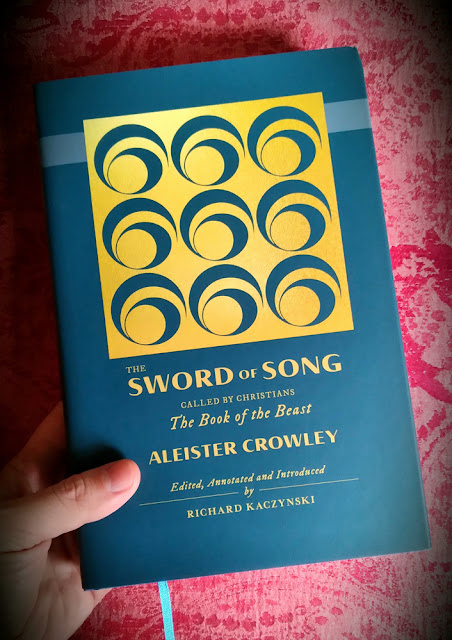 |
| The Sword of Song. Aleister Crowley. Edited by Richard Kaczynski |
Several months ago, I was fortunate enough to aquire one of the limited release copies of "The Sword of Song" by Aleister Crowley (edited by Richard Kaczynski). I looked through most of it at the time, but decided to pick it up again for a cover to cover read. Originally published in 1904, this is a pivotal early work by Crowley.
The Sword of Song (1904) is the most important of Aleister Crowley’s early works. His first talismanic book, it synthesized his interests in poetry, religion, mysticism and magick into a work that is at turns witty, profound and baffling. It would serve as the template to his celebrated Konx Om Pax (1907), and his unsurpassed mix of profundity and absurdity in The Book of Lies (1912/3). Significantly, it also offers insight into his mindset around the time of his received text, The Book of the Law, in 1904.
This edition follows the layout of The Sword of Song’s rare first edition, while incorporating subsequent revisions and additions from its republication in volume 2 of Crowley’s Collected Works (1906). The introduction by Crowley biographer Richard Kaczynski’s documents this book’s genesis and extensive revisions, while editorial footnotes illuminate obscure references, kabbalistic riddles, altered or deleted passages, and much more.
From the introduction
Crowley arrived in Ceylon armed with a library of books printed on India paper and custom-bound with silk ties to help withstand the elements. Among these were works by Robert Browning (1812–1889). The Victorian poet loomed large in Crowley’s thinking about the craft of poetry, as revealed by his letters from this period. Responding to a critique of Browning by his friend, painter Gerald Kelly (1879–1972), Crowley wrote, [E]very body knows that I live with R[obert] B[rowning]. I do not find a “pungent weight of thought in each sentence” of R.B.’s, not in his best lines, except perhaps the very best. You get this concentrated thought by dropping out articles, auxiliary verbs and such trifles: “why cumber they the ground?” e.g., “Aischulos’ bronze-throat eagle-bark at blood.” This is very fine.
But I find generally he is too diffuse as to his central meaning—too thin—“diluted presentation” a scientist would say: but too concentrated on his own parentheses. And above all you must read him again and again. You know I cannot read Sordello: when I know from a history-book all his characters I shall become able to, perhaps. With Fifine also, the mental strain is too great: though each paragraph is superb, I cannot read straight through. When I have worked at Fifine in detail till each detail gets familiar, then only shall I for the first time read that poem. Read with a big R.
Within a month of finishing “Ascension Day” and “Pentecost,” Crowley wrote to Kelly,
You know my idea that all poetry should suggest its subject by its sound, as music does. Perhaps Wagner’s leit-motif is even more allowable in poetry. Rosetti utterly misunderstood the refrain and destroyed its use. See Browning, “Sucked along in the flying wake / Of the luminous water-snake” in Xmas Eve; Pippa’s appearances (the use of lyric rather) in that play; the word “Porphyria” in “P[orphyria]’s Lover” thrice used. And look how Aeschylus will harp on μεγας, μελας, τελος, βροντος, θανατος and such words using them in this very leitmotif way—that very repetition which the ordinary fool tells you to avoid. Many other examples will occur to you.
Crowley would employ this technique in Sword of Song. Seizing upon a statement in Mansel’s Encyclopædia Britannica article on metaphysics—
If, in any mode of consciousness whatever, an external object is directly presented as existing in relation to me, that object, though composed of sensible qualities only, is given as a material substance, existing as a distinct reality, and not merely as a mode of my own mind
—Crowley echoed “a mode of my own mind” as a refrain throughout “Pentecost” (cf. lines 370, 545, 644, 780, 812). Also, Crowley’s words
Aum! let us meditate aright
On that adorable One Light,
Divine Savitri! So may She
Illume our minds! So mote it be!
form lines 519–522 of “Pentecost,” and repeat at the end of the poem.
From “Ascension Day,” lines 98-111:
Yet by-and-by I hope to weave
A song of Anti-Christmas Eve
And First- and Second-Beast-er Day.
There’s one who loves me dearly (vrai!)
Who yet believes me sprung from Tophet,
Either the Beast or the False Prophet;
And by all sorts of monkey tricks
Adds up my name to Six Six Six.
Retire, good Gallup! In such strife her
Superior skill makes you a cipher!
Ho! I adopt the number. Look
At the quaint wrapper of this book!
I will deserve it if I can:
It is the number of a Man.
